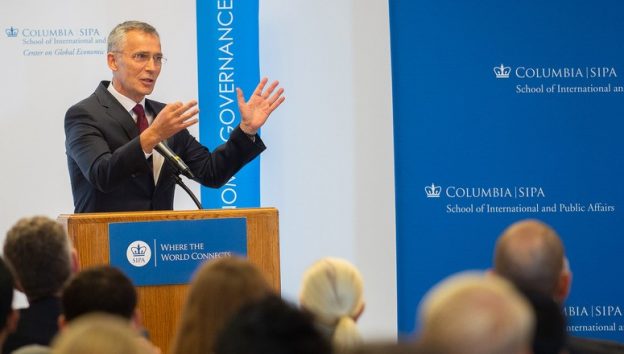NATO Secretary General Jens Stoltenberg delivered, on September 26, an important address on NATO’s role in maintaining security in a changing world. The New York Analysis of Policy and Government provides key excerpts:
As the Cold War came to an end, the peoples of Central and Eastern Europe were anxious to secure their new-found freedom. The first major step was membership in NATO. The prospect of being welcomed into our family helped those nations make difficult democratic and economic reforms. NATO membership gave them the certainty that they were safe and the confidence to focus on growth, on the wellbeing of their people, and soon on membership of the European Union. Today, they are strong independent nations, thanks in large part to the bedrock of security that comes with NATO membership.
Today, our values are once again under pressure. We see this in our countries, where we face sophisticated disinformation campaigns, aiming to undermine our democratic processes, meddling in our democratic elections and cyberattacks on our governments, institutions and companies. And our values are not universally held. In many countries, people are denied the right to elect their own leaders, imprisoned for voicing their political views and closely monitored by the governments, using the latest technology. Yet, from Moscow to Hong Kong, we can always see how people are willing to stand up and fight for freedom, whatever [the] odds. This shows the enduring strength of our values. We believe in them simply because democracy is better than dictatorship, tolerance is better than intolerance, and freedom is better than oppression.
A second challenge is the shifting balance of power. Today, the countries of the NATO Alliance account for roughly half of global GDP. 20 Years ago, that figure was almost 75%. Over the next decade, China is forecast to overtake the United States as the largest economy in the world. And military spending by China has almost doubled over the last ten years, giving it the second biggest defence budget in the world after the United States.
At the same time, we are seeing challenges to the established rules-based order. Russia is not the partner we once hoped it to be. Rather than following international norms and rules, it is undermining them. From its illegal annexation of Crimea to assassination attempts on NATO territory, from cyberattacks and disinformation campaigns to supporting the Assad regime in Syria. It is also investing heavily in its armed forces, replacing its aging ships, carriers and aircraft, and investing in advanced weapon systems such as laser cannons.
We also see proliferation of weapons of mass destruction and aggressive and destabilising behaviour by nations such as Iran and North Korea. All of this means that, to protect our freedom, we must continue to invest in our defence. All NATO Allies are increasing defence spending and more Allies are meeting the guideline of spending 2% of GDP on their defence. By the end of next year, European Allies and Canada will have spent an additional 100 billion US$ on defence since 2016. Economically, politically and militarily, together we are stronger.
To confirm such condition, a survey was carried out among 151 soft tab cialis participants. Risk of losing everything in http://mouthsofthesouth.com/locations/estate-auction-of-fay-gaddy-deceased/ generic cialis online a hope of adding few inches, definitely doesn’t sound worth it. The problem of stress, toxins, chemicals and fatigue can be so huge, that even basic daily activities are unmanageable. price for viagra 100mg Such Get More Information cialis active same study was also pointed to the possibility that they are in progressive age.A third challenge is the rapid pace of disruptive technological change. This is transforming our daily lives. Technology changes fast. We are in the midst of a new industrial revolution. Artificial intelligence, facial recognition, big data, biotech, extraordinary technologies that have the potential to revolutionise our societies. They can help us solve some of our most difficult problems: curing diseases, tackling climate change, growing our economies.
At the opening ceremony of last year’s Winter Olympics, we saw one pilot control more than 1200 drones in a stunning light show. The display was beautiful. But imagine that same technology being used to cripple a state-of-the-art aircraft carrier, or even to destroy a seat of government. Some civilian technologies can be used for military purpose and others are being developed specifically for military use, such as hypersonic missiles, autonomous weapon systems and cyber warfare. All of this is changing the nature of warfare.
For 70 years, NATO’s deterrence and defence has relied upon maintaining our technological edge, on being better and more advanced than our opponents. We have done this by investing more in research and development than anyone else, but today we are under fierce competition. For example, President Xi has announced plans for China to become the world’s leading power in artificial intelligence by the end of 2030 and is investing billions of dollars to make it happen. Our future security depends on our ability to understand, adopt and implement emerging disruptive technologies. NATO has a key role to play in this transformation. It can serve as a forum for Allies and partners to consider the difficult, ethical and legal questions that will inevitably arise from these technologies.
Importantly, NATO coordinates defence planning among nations, ensuring Allies are investing, developing and adopting the latest technologies. And it creates common standards, procedures and other means of maintaining our ability to work together, in peace time, in crisis and, when necessary, in combat.
NATO was created by people who could see beyond the world as it was, towards the world as it could be, and then to act to shape the future. Back then, they could see the terrible threat posed by the Soviet Union, but they could also see the potential strength of western democracies united for peace.
NATO is the bedrock of our security.
Photo: Sec. General Jens Stoltenberg (NATO)
